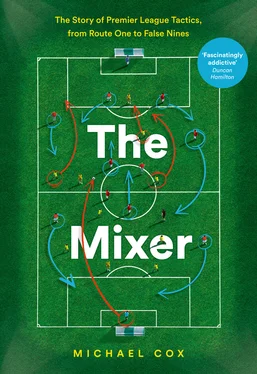Bergkamp was, aesthetically, among the Premier League’s greatest players and scored some wonderful goals during his 11 years at Arsenal. His classic strike was receiving the ball just outside the box in an inside-left position, before opening up his body and curling the ball into the far corner, a goal he scored four times in the space of 18 months, against Sunderland, Leicester and both home and away against Barnsley in 1997/98. Bergkamp also netted two of the Premier League’s most famous goals. The first was against Leicester in 1997, where he brilliantly brought down a long ball, turned inside and finished coolly – a goal which foreshadowed his similar World Cup winner against Argentina the following summer – and there was also the astonishing, extravagant opener against Newcastle in 2002, where he flicked the ball one way around Nikos Dabizas with the inside of his left foot, then spun in the opposite direction before collecting the ball and converting with his right. It prompted years of debate about whether it was intentional, and when Arsenal commissioned a statue of Bergkamp outside their Emirates Stadium, the sculptor complained that goal was simply impossible to depict.
Bergkamp only played for a year under the manager who brought him to Arsenal, and the circumstances of Rioch’s departure were peculiar. He was dismissed shortly before the start of 1996/97, a fortnight after signing a new contract. This time around, Dein got his wish and Wenger was appointed. But as Arsenal chairman Peter Hill-Wood admitted, both he and Dein had already been in regular dialogue with Wenger, who later accidentally revealed that he’d been consulted about Bergkamp’s arrival. It seems Rioch was unwittingly a caretaker manager, a short-term stopgap between two very different eras of Arsenal, but he nevertheless deserves great credit for starting the revolution.
Back in 1996 hiring a foreign coach was considered extremely dangerous. There was one other in the Premier League, as Ruud Gullit had recently been appointed Chelsea player-manager, but the Dutchman was a world-renowned footballer who had already played in the Premier League. Wenger was understandably unheard of in England, at a time when there was minimal coverage of foreign football aside from Channel 4’s Football Italia , and before the internet was widespread. Six years earlier Aston Villa had appointed the first-ever overseas manager of a top-flight side: the mysterious Dr Jozef Vengloš. It was a disastrous experiment. Villa had finished second the previous campaign, but under the Slovakian (he was then considered Czechoslovakian) they finished two places above relegation. He appeared incompatible with the English approach, but the man with a doctorate in physical education was essentially a forerunner of Wenger, and not simply because he was foreign – he attempted to professionalise English football. ‘Never had I imagined it was possible for human beings to drink so much beer,’ he gasped shortly after his arrival. Years later he took a more considered view. ‘A few things in those days were a bit different to what we had been doing in central Europe – the methodology of training, the analysing of nutrition, and the recuperation, regeneration and physiological approach to the game.’ The Premier League desperately needed a foreign coach like Wenger to successfully implement modern methods. As Dein said, ‘The combination of Arsène and Dennis changed the culture of Arsenal.’
Wenger was completely different from anyone else in the Premier League, frequently described as looking more like a teacher than a football manager; he spoke five languages, had a degree in economics and had briefly studied medicine. More than anything, he appeared extraordinarily calm, a quality he’s occasionally lost in recent years. Football managers were supposed to be ranters, ravers, eternally angry people; Alex Ferguson famously dished out the ‘hairdryer treatment’. A year before Wenger’s appointment, Leyton Orient manager John Sitton had been the subject of a Channel 4 documentary that recorded him threatening to fight his own players in a famously bizarre dressing-room outburst. ‘When I tell you to do something, do it, and if you come back at me, we’ll have a fucking right sort-out in here,’ he roared at two players. ‘All right? And you can pair up if you like, and you can fucking pick someone else to help you, and you can bring your fucking dinner, ’coz by the time I’ve finished with you, you’ll fucking need it.’ That was the 1990s football manager. Wenger was the opposite, stunning his players by demanding a period of complete silence at half-time. More to the point, he certainly wasn’t asking players to bring their dinner.
Wenger’s major impact upon English football was revolutionising his players’ diet. Before the Frenchman’s arrival, Arsenal’s squad – in common with the majority of Premier League teams – had the culinary preferences of a pub team. They’d enjoy a full English breakfast before training, and their pre-match menu included fish and chips, steak, scrambled eggs and beans on toast. Post-match, things became even worse. On the long coach journey back from Newcastle, for example, some players held an eating competition, with no one capable of matching the impressive nine dinners consumed by centre-back Steve Bould. When Tony Adams and Ray Parlour were given a police caution for spraying a fire extinguisher at abusive Tottenham supporters, the incredible thing wasn’t that the incident had taken place at a Pizza Hut, but that when the police pulled up outside Adams’s house later that night, the pair had recently taken delivery of a Chinese takeaway, too.
Wenger, meanwhile, had been impressed by the healthiness of Japanese cuisine, noticing the low level of obesity throughout the country. He quickly overhauled the dietary options at Arsenal’s training ground, banning sweets, chocolate and Coca-Cola, and encouraging his players to eat steamed fish, boiled chicken, pasta and plenty of vegetables. Whenever Arsenal stayed in a hotel before an away match, Wenger banned room service and insisted that the mini-bars were emptied before the team’s arrival. Crucially, he introduced dieticians who educated the players about good nutrition, and concentrated heavily upon the benefit of chewing slowly to digest food properly. Wenger knew there would be a backlash, and intelligently ensured that meals were particularly bland and flavourless in the opening weeks. Then, when the players complained, Wenger made concessions – allowing them tomato ketchup, for example – so the new arrangement appeared a compromise. Wenger set the example, always eating exactly the same meals as his players.
The previous innovator in this respect was Australian Craig Johnston, who played for Liverpool in the 1980s and was one of football’s most intelligent, innovative characters, designing the Adidas Predator boot after his retirement. He was inspired by a book called Eat to Win by Robert Haas, and eschewed Liverpool’s steaks in favour of rice, soy bacon and egg, initially prompting mockery from teammates. But when they noticed his tremendous stamina, they gradually switched to his diet. Intriguingly, Adams says he and a couple of Arsenal teammates read the book in 1987, nearly a decade before Wenger’s arrival, but if it provoked them to eat some healthy food they were clearly cancelling out any benefits by also consuming pizzas and Chinese takeaways.
It wasn’t all about food, however. Wenger also encouraged his players to take supplements, an unorthodox concept at this stage. Vitamin tablets were placed on tables ahead of training, and many players started taking Creatine to build muscle and improve stamina. Again, everything was explained by experts, and while an improved diet was mandatory, the supplements were optional. Bergkamp was sceptical and didn’t take anything, while goalkeeper David Seaman started off without them, then noticed how his teammates were improving physically, so changed his mind. Ray Parlour admitted he simply took whatever was given to him without a second thought. Arsenal’s physical improvement was obvious, and on international duty, England teammates asked the Gunners contingent what they’d been taking, and quickly copied, which annoyed Wenger, who was understandably determined to maintain Arsenal’s competitive advantage. Unintentionally, the Frenchman was revolutionising the whole of the Premier League, not simply his own club.
Читать дальше












